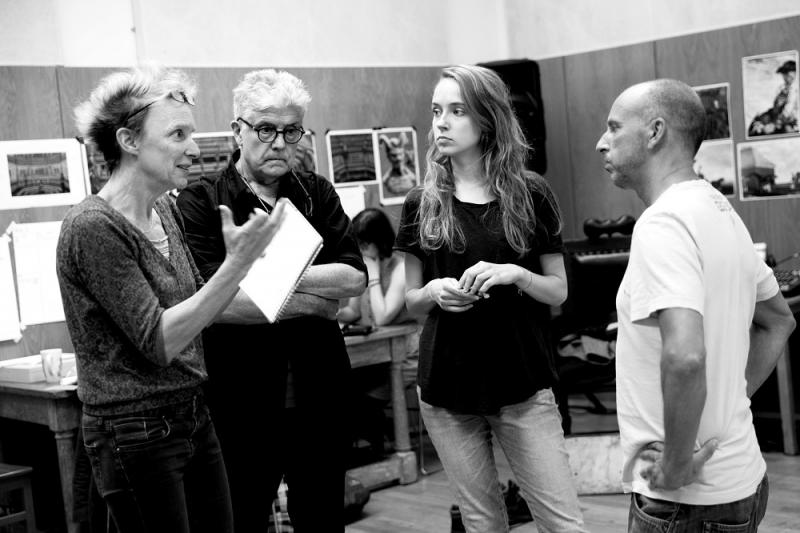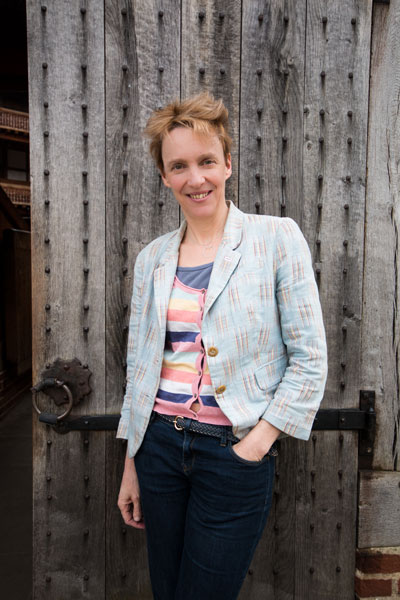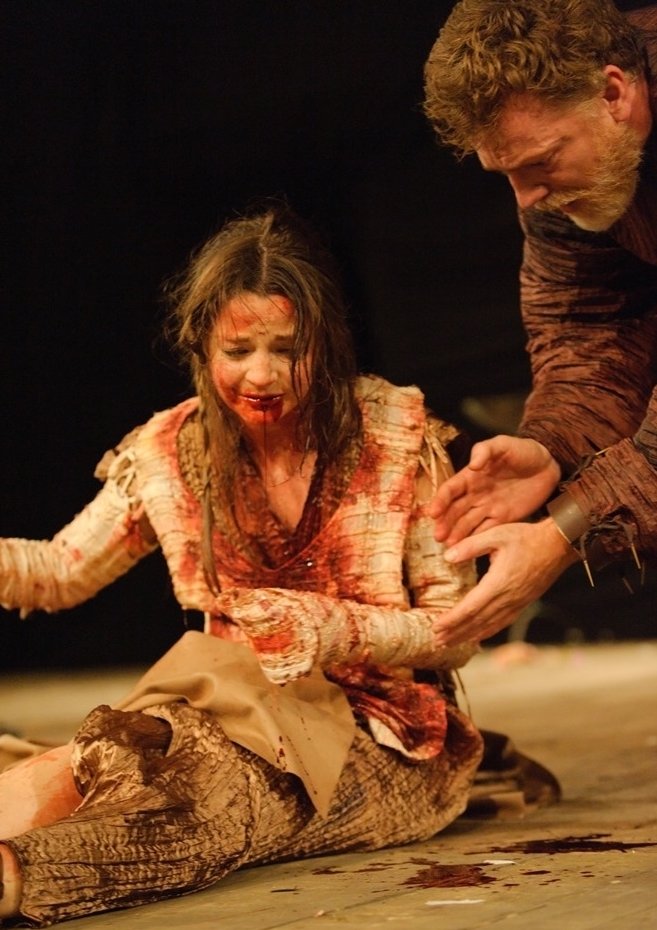10 Questions for Director Lucy Bailey | reviews, news & interviews
10 Questions for Director Lucy Bailey
10 Questions for Director Lucy Bailey
Is Milton's rarity Comus such a far cry from her shocking Globe hit Titus Andronicus?

Theatre was not Lucy Bailey’s first target. At school she was a flautist, headed probably for music. Then, in her gap year, she took a job as a telephonist at Glyndebourne, and noticed a vigorous man with a beard – name of Peter Hall – moving people around on stage. She asked what he was doing. Directing, she was told. That changed her.
At Oxford, she staged the first-ever dramatisation of a short prose text titled "Lessness" by Samuel Beckett, whom she’d visited in Paris. In her early 20s she assisted Hall at the National Theatre, and directors such as Terry Hands and Adrian Noble at the Royal Shakespeare Company. By the 1990s she had moved into music-theatre, mounting highly original productions by the likes of John Tavener and Alexander Goehr, as well as reviving Dmitri Shostakovich’s 1958 operetta Cheryomushki, at the Lyric Hammersmith in 1994.
Five years later, Bailey’s breakthrough in straight theatre came with a magnificently inventive version of Baby Doll, a 1956 film based on a one-act play by Tennessee Williams. Starring Charlotte Emmerson and Jonathan Cake, the show was a hit in the West End and at the National. Williams, along with Pier Paolo Pasolini, remain key figures for Bailey – she directed relatively unknown pieces by both at the Print Room, which she co-founded with Anda Winters in 2010.
In 1997 Mark Rylance invited her to direct at Shakespeare’s Globe. She has done five plays there, including in 2006 a famously visceral Titus Andronicus at which audience members regularly fainted (the production was revived in 2014). Now, she has been asked back to the Globe by its chief, Emma Rice, to direct John Milton’s masque, Comus, in the Sam Wanamaker Playhouse.
I think Emma’s been incredibly courageous. She’s got balls
At the end of a challenging rehearsal period, Lucy Bailey talked to theartsdesk about this 1634 curiosity – and, among other things, where women are in contemporary British theatre. (Note: that this interview was conducted a few days before Emma Rice's departure from the Globe was announced.)
JAMES WOODALL: What brought you to Comus?
LUCY BAILEY (pictured below): I began looking for an appropriate piece for Emma’s first winter season. I wanted something that would relate to what she did in the summer, which was themed around woods. I thought about a JM Barrie piece, but that didn’t feel right for the Wanamaker. She and I went through so many ideas to the point where I was going to have to say, “I can’t do this – I simply don’t have the right play for you.” I didn’t want to do a standard Jacobean piece, but something much more left-field. The inspirational moment came when Mike Poulton [Bailey’s playwright collaborator on her productions of Fortune’s Fool and Kenny Morgan] tipped me off about Comus. Honestly, Milton! At Oxford I found him impenetrable. But I read the poem, thought it was one of the hardest things I could do, but also knew Emma would love its fairytale quality, its study of sexual awakening.
So how good is Comus – what’s the story?
 A point to make straight off is that Milton was not a dramatist. He was 25 when he wrote Comus, trying to find his voice and swinging all over the place. He obviously borrowed left, right and centre from A Midsummer Night’s Dream. There’s a bit of pastoral, with some amazing Milton-like things we recognise from Paradise Lost – you know, a thought lasting 15 lines. So as theatre it’s pretty ungainly and very unlike Shakespeare, and is largely unperformed because it’s difficult to know what it is. Basically, a chaste virgin – first acted by the 15-year-old daughter of the earl [of Bridgewater] for whom it was written – undergoes a test of rape in a forest. The drama has to bring out all the arguments for temperance, virtue and abstinence so as to prevent the crime – Comus, a son of Bacchus and, according to Milton, Circe, is the potential rapist: his pastime is to turn innocents into sexual monsters. That’s the essence of it. In the central act, the virgin is trapped in a room and tied to a chair. No one knows she’s there – every parent’s nightmare, I guess – so she has to use her brain to talk her way out of being raped.
A point to make straight off is that Milton was not a dramatist. He was 25 when he wrote Comus, trying to find his voice and swinging all over the place. He obviously borrowed left, right and centre from A Midsummer Night’s Dream. There’s a bit of pastoral, with some amazing Milton-like things we recognise from Paradise Lost – you know, a thought lasting 15 lines. So as theatre it’s pretty ungainly and very unlike Shakespeare, and is largely unperformed because it’s difficult to know what it is. Basically, a chaste virgin – first acted by the 15-year-old daughter of the earl [of Bridgewater] for whom it was written – undergoes a test of rape in a forest. The drama has to bring out all the arguments for temperance, virtue and abstinence so as to prevent the crime – Comus, a son of Bacchus and, according to Milton, Circe, is the potential rapist: his pastime is to turn innocents into sexual monsters. That’s the essence of it. In the central act, the virgin is trapped in a room and tied to a chair. No one knows she’s there – every parent’s nightmare, I guess – so she has to use her brain to talk her way out of being raped.
You’re staging this with your husband, William Dudley, designing. How have you gone about it?
Bill and I got interested in the outer frame, the historical context of the masque, commissioned as a one-off event. Part of the original idea was that the earl was putting his daughter on display, like a debutante, so that he could find a good husband for her. What we’ve done is have the earl falling off his chair and being swallowed up, with the rest of his household, into a giant sewer or hole, Alice in Wonderland-like. That’s how they get to the forest. They must all emerge there, as if from a giant fart. Now, in the Wanamaker, that’s kind of virtually impossible: you’re allowed no sound effects, no lighting and so on. It’s been a bit of a headache. But that, with our writer Patrick Barlow – who is brilliant but we’re changing things every day – is how we’ve framed it.
 You had a huge success, with Bill, with Titus Andronicus. What was the thinking behind it? (Pictured right: Flora Spencer-Longhurst and William Houston)
You had a huge success, with Bill, with Titus Andronicus. What was the thinking behind it? (Pictured right: Flora Spencer-Longhurst and William Houston)
As in the Wanamaker, our addressing of the open-air Globe space was to be site-specific. We wanted to respond to it as an arena. The play’s a bloodbath, so we looked at gladiatorial arenas – Rome, essentially, the Colosseum. The idea that came to us was a temple of death. The webbing we designed to cover the groundlings area was an attempt to recreate the cloths that were draped over the ancient duels to keep the sun out. It’s hard to get atmospheric lighting at the Globe, but with sun coming through the gaps there were light and shade. Plus the incense – well, there we had our strange, heady slaughter space... With all the blood, we were succeeding emotionally. Top fainting rate for one performance was 43. If it was three, I was disappointed.
What are the pleasures, and perhaps some of the less good things, about directing at the Globe?
In both spaces, you’re primarily required to tell the story with the actors. That’s an incredible pleasure. You have only the actor’s body and the way you stage a play to do this. I always thought of it as combative, where the actors had to engage with the audience in, well, a gladiatorial way. The Globe is so hard: if you don’t get it right at once people go and have a drink. The Wanamaker is different because it’s so intimate, a gift to an actor, but also impossible because of sightlines. It’s not a scenic space. Whatever you do blocks someone’s vision. It’s an aural space, which makes it very tough on theatre-makers and actors.
Where do you think Emma Rice is taking the Globe?
She’s bringing it into the 21st century. She’s celebrating the space as well as liberating other aspects of theatre by using these tools with which we’re so familiar: lots of lights and blasts of sound. It’s really an experiment, in that she’s not buying in to the "let’s-do-it-how-we-think-Shakespeare-did-it". As we don’t know how Shakespeare did it, I appreciate that a lot. The space should be explored in every way. It’s a huge change. I think she’s been incredibly courageous. She’s got balls.
Women as theatre directors, and women running theatres today: do you have a view?
I don’t really have a strong one. I wish there were more female artistic directors, of course. Who are the women with the power to change the map? That is a crucial question. I feel positive about the number of women directors who have come through. The change I’ve seen is beyond belief. At one point in my life, I felt like just one of three or four. I know there are many more now, but I was really aware of rubbing shoulders with a certain few of my generation, with two or three above me – Deborah Warner, Sue Dunderdale, Sue Parrish, to name some whose work one wanted to see – and some below; but now it’s so different. What’s changed is that women are moving into all sorts of different jobs across the spectrum, not just in theatre. It must go back to a certain confidence and certain educational options. When I went to the RSC there were 12 male directors: I was assisting. It was really difficult to climb from that to directing. The hierarchy was firm. That structure has opened and there are no longer, for example, that top-heavy 12 at the RSC. I’m not answering this very intelligently, as it’s such a big and complex issue.
How did you move on from music-theatre and opera?
After working with modern composers, Birtwistle, Berio, Tavener, I got thought of as "Miss Avant-Garde", so was a bit pigeonholed. Finally I wanted to do something more popular, relating to ordinary people. That’s where Mark Rylance comes in. He began my close relationship with the Globe. In the first season, he offered me The Winter’s Tale, but that terrified me. I turned it down. I’d assisted on it at the RSC, but it’s a really hard play, too difficult for me to take on at that stage having done masses of opera and music. So I snuck in at the end of that season with Beaumont and Fletcher’s The Maid’s Tragedy. Music-theatre and opera were often about mise-en-scène, making huge visual statements. The Globe was about working with actors, with a passion for and an interest in ideas, which was an enormous discovery: changed my life. I haven’t touched opera since.
Where does your love of Pasolini and Tennessee Williams spring from?
Both were outsiders. Both were homosexuals, at the same period, when it was hard to be openly. Being troubled dictated almost everything about their art. Pasolini was a genius, with an understanding of the folk, primal roots of who we are, where we come from. Williams was different, always more contemporary, exploring these frustrated, lonely, repressed, unfulfilled people. For some reason I’m drawn to these difficult voices. I’d seen Baby Doll as a teenager. If you get to know a play, film or book between 16 and 20, it never leaves you. It’s about that burgeoning sexuality again, like the girl in Comus. Things are coming in and fermenting, then remain forever.
What’s next?
The Graduate, in April. It’s Terry Johnson’s version, the one that ran in the West End in 2000 with Kathleen Turner. I feel it needs another outing. It’s one you really have to get under the skin of. It also needs, in my view, to be sexier.
Explore topics
Share this article
Add comment
The future of Arts Journalism
You can stop theartsdesk.com closing!
We urgently need financing to survive. Our fundraising drive has thus far raised £33,000 but we need to reach £100,000 or we will be forced to close. Please contribute here: https://gofund.me/c3f6033d
And if you can forward this information to anyone who might assist, we’d be grateful.

Subscribe to theartsdesk.com
Thank you for continuing to read our work on theartsdesk.com. For unlimited access to every article in its entirety, including our archive of more than 15,000 pieces, we're asking for £5 per month or £40 per year. We feel it's a very good deal, and hope you do too.
To take a subscription now simply click here.
And if you're looking for that extra gift for a friend or family member, why not treat them to a theartsdesk.com gift subscription?
more Theatre
 Fiddler on the Roof, Barbican review - lean, muscular delivery ensures that every emotion rings true
This transfer from Regent's Park Open Air Theatre sustains its magic
Fiddler on the Roof, Barbican review - lean, muscular delivery ensures that every emotion rings true
This transfer from Regent's Park Open Air Theatre sustains its magic
 In Praise of Love, Orange Tree Theatre review - subdued production of Rattigan's study of loving concealment
Unspoken emotion flows through this late work
In Praise of Love, Orange Tree Theatre review - subdued production of Rattigan's study of loving concealment
Unspoken emotion flows through this late work
 Letters from Max, Hampstead Theatre review - inventively staged tale of two friends fighting loss with poetry
Sarah Ruhl turns her bond with a student into a lesson in how to love
Letters from Max, Hampstead Theatre review - inventively staged tale of two friends fighting loss with poetry
Sarah Ruhl turns her bond with a student into a lesson in how to love
 Elephant, Menier Chocolate Factory review - subtle, humorous exploration of racial identity and music
Story of self-discovery through playing the piano resounds in Anoushka Lucas's solo show
Elephant, Menier Chocolate Factory review - subtle, humorous exploration of racial identity and music
Story of self-discovery through playing the piano resounds in Anoushka Lucas's solo show
 This is My Family, Southwark Playhouse - London debut of 2013 Sheffield hit is feeling its age
Relatable or stereotyped - that's for you to decide
This is My Family, Southwark Playhouse - London debut of 2013 Sheffield hit is feeling its age
Relatable or stereotyped - that's for you to decide
 The Frogs, Southwark Playhouse review - great songs save updated Aristophanes comedy
Tone never settles, but Sondheim's genius carries the day
The Frogs, Southwark Playhouse review - great songs save updated Aristophanes comedy
Tone never settles, but Sondheim's genius carries the day
 Mrs Warren's Profession, Garrick Theatre review - mother-daughter showdown keeps it in the family
Shaw's once-shocking play pairs Imelda Staunton with her real-life daughter
Mrs Warren's Profession, Garrick Theatre review - mother-daughter showdown keeps it in the family
Shaw's once-shocking play pairs Imelda Staunton with her real-life daughter
 The Crucible, Shakespeare's Globe review - stirring account of paranoia and prejudice
Ince's fidelity to the language allows every nuance to be exposed
The Crucible, Shakespeare's Globe review - stirring account of paranoia and prejudice
Ince's fidelity to the language allows every nuance to be exposed
 The Fifth Step, Soho Place review - wickedly funny two-hander about defeating alcoholism
David Ireland pits a sober AA sponsor against a livewire drinker, with engaging results
The Fifth Step, Soho Place review - wickedly funny two-hander about defeating alcoholism
David Ireland pits a sober AA sponsor against a livewire drinker, with engaging results
 The Deep Blue Sea, Theatre Royal Haymarket review - Tamsin Greig honours Terence Rattigan
The 1952 classic lives to see another day in notably name-heavy revival
The Deep Blue Sea, Theatre Royal Haymarket review - Tamsin Greig honours Terence Rattigan
The 1952 classic lives to see another day in notably name-heavy revival
 The Brightening Air, Old Vic review - Chekhov jostles Conor McPherson in writer-director's latest
The Irishman's first new play in over a decade is engaging but overstuffed
The Brightening Air, Old Vic review - Chekhov jostles Conor McPherson in writer-director's latest
The Irishman's first new play in over a decade is engaging but overstuffed
 1536, Almeida Theatre review - fast and furious portrayal of women in Henry VIII's England
This wild, intelligent play is a tour de force till the doom-laden finale
1536, Almeida Theatre review - fast and furious portrayal of women in Henry VIII's England
This wild, intelligent play is a tour de force till the doom-laden finale

Comments
"She’s bringing it into the